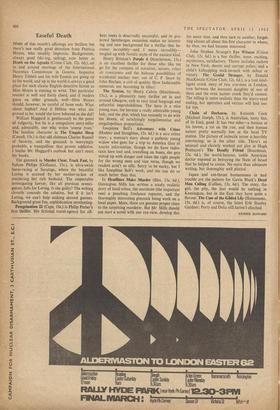Easeful Death
MOST of this month's offerings are thrillers but there's one really good detection from Patricia Moyes, who steadily improves. Backgrounds, always good (ski-ing, sailing), now better in Death on the Agenda (Crime Club, 12s. 6d.), set in and around meetings of the International Narcotics Commission in Geneva. Inspector Henry Tibbett and his wife Emmie are going up in the world, and up in the world is always a good place for such classic English detective fiction as Miss Moyes is coming to write. This particular murder is well and fairly clued, and if readers guess on other grounds, well—Miss Moyes should, however, be careful of loose ends. What about Sophie? And if Helene was what she proved to be, would she have behaved as she did?
William Haggard is gentlemanly to the point of vulgarity, but he is a compulsive story-teller and, admirably, one who writes 'averse from.' The familiar character in The Unquiet Sleep (Cassell, 15s.) is that old clubman Charles Russell of Security, and the gimmick is worryingly probable, a tranquilliser that proves addictive. I loathe Mr. Haggard's outlook but can't resist his books.
The gimmick in Murder Clear, Track Fast, by Judson Philips (Gollancz, 15s.), is ultra-swish horse-racing at Saratoga, where the beautiful Loring is accused by her mother-in-law of murdering her rich husband. The respectable investigating lawyer, like all previous investi- gators, falls for Loring. Is she guilty? The writing cleverly conceals the solution, but if it isn't Loring, we can't help making shrewd guesses. Background great fun, sophistication unrelenting.
Peregrination 22 (Cape, 16s.) is Philip Purser's first thriller. His fictional travel-agency for off-
beat tours is deservedly successful, and its pro- jected Spitzbergen excursion -makes an interest- ing and new background for a thriller that be- comes incredibly—and I mean incredibly— tangled up with Nordic myth of the nastiest kind.
Henry Brinton's Purple 6 (Hutchinson, 15s.) is an excellent thriller for those who like me go for the compote of scientists, secrets, crises de conscience and the hideous possibilities of accidental nuclear war; out of C. P Snow by John Buchan, a colt of quality. How fashionable numerals are becoming in titles!
The System, by Henry Calvin (Hutchinson, 15s.), is a pleasantly zany thriller set in and around Glasgow, rich in racy local language and colourful improbabilities. The hero is a nice young man, the heroine a really admirable young lady, and the plot, which has remotely to do with the Bomb, of satisfyingly megalomaniac and megalopolitan proportions.
Josephine Bell's Adventure with Crime (Hodder and Stoughton, 12s. 6d.) is a nice crime story, a woman's story about a pathetic young widow who goes for a trip to America (lots of tourist information, though we do have radio- taxis here too) and, travelling on buses, she gets mixed up with danger and takes the right people for the wrong ones and vice versa, though we readers aren't so silly. Sorry to be narky, but I like Josephine Bell's work, and she can do so much better than this.
In Headlines Make Murder (Bles, 13s. 6d.), Osmington Mills has written a nicely realistic story of local crime, the murderee (the important one) a poaching freelance reporter, and the thoroughly interesting gimmick being work on a local paper. More, there are genuine proper clues to the surprising murderer. But Mr Mills should not start a novel with one eye-view, develop this for some time, and then turn to another, forget- ting almost all about this first character in whom, by then, we had become interested.
John Stephen Strange's Eye Witness (Crime Club, 12s. 6d.) is a fine thriller, tense, exciting, mysterious, satisfactory. Theme includes rackets in New York, decent and corrupt police, and a child's kidnapping neck-to-neck with defeat or victory. The Genial Stranger, by Donald MacKenzie (Crime Club, 12s. 6d.), is a taut intel- ligent crook story of two con-men in London, torn between the innocent daughter of one of them and the even nastier crook they'd conned. The telling is more realistic than the starry-eyed ending, but operators and victims will find use- ful tips.
Chain of Darkness, by Kenneth Cook (Michael Joseph, 15s.), is Australian, nasty but, of its kind, good. It has two sides—a human at his lowest, a rat on the run, and then human nature pretty normally low at the local TV station. The picture of imbecile terror is horribly convincing; so is the other side. There's an unusual and cleverly worked out plot in Hugh Pentecost's The Deadly Friend (Boardman, 12s. 6d.), the world-famous, noble American doctor exposed as betraying the State of Israel that he helped to create. No more than adequate writing, but thoroughly well plotted.
Japan and cut-throat businessmen in bad trouble are the pattern for Gavin Black's Dead Man Calling (Collins, 12s. 6d.). The story, the girl, the pity, the fear would be nothing in Kensington, but in the East they have quite a flavour. The Case of the Gilded Lily (Heinemann, 13s. 6d.) is, of course, the latest Erie Stanley Gardner; Perry and Delia still haven't clinched.
ESTHER HOWARD


































 Previous page
Previous page